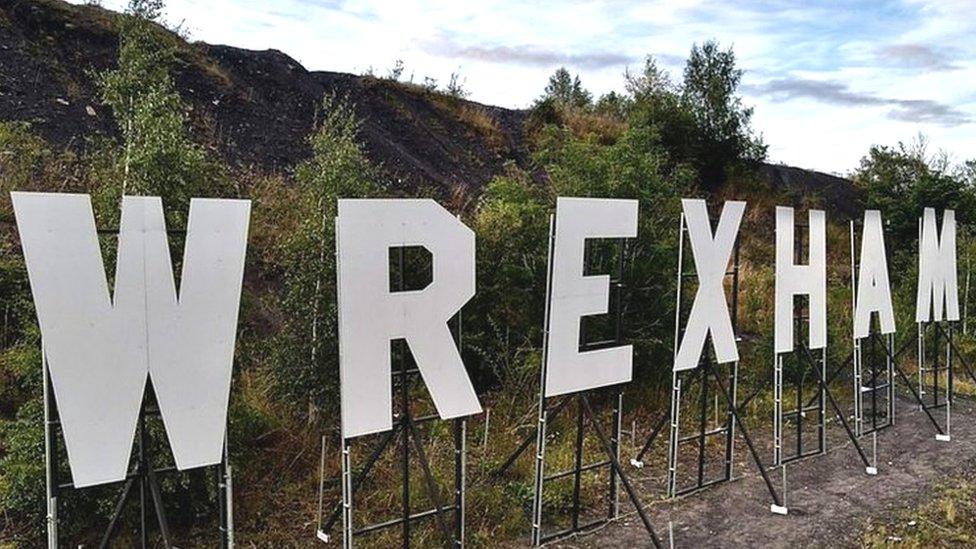Platinum Jubilee: How strong is Wales' bond with the monarchy?
- Published
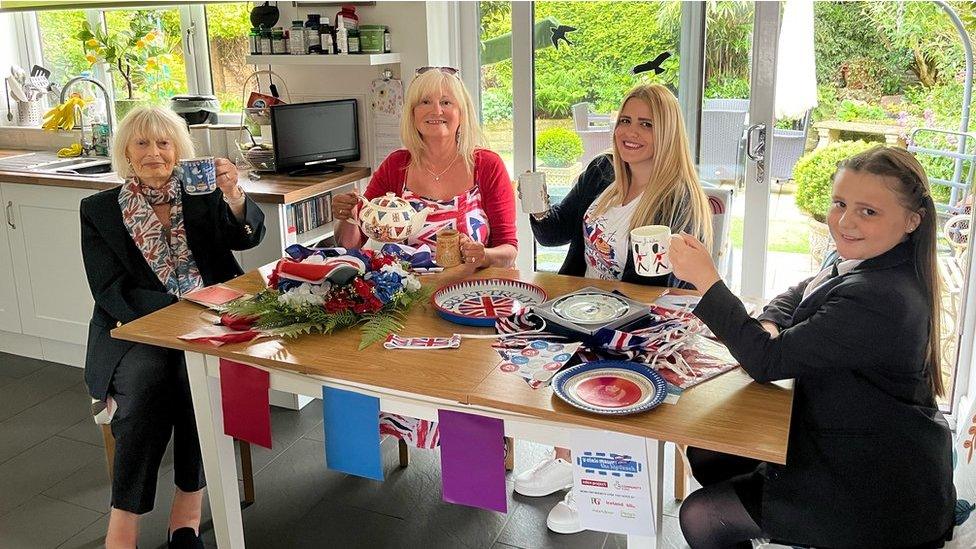
Four generations will celebrate the jubilee, from the left, Jeanette Parsons, 89, Emma Parsons-Reid, 54, Hannah Bees, 32 and Izabella Bees, 11
As the Queen prepares to mark her Platinum Jubilee this weekend, BBC Wales has been talking to people about their views on the monarchy.
Many are looking forward to celebrating the Queen and her contribution to the nation by throwing street parties to mark the event, but others feel indifferent to the institution and the event or question the opulence of the monarchy during the cost of living crisis.
Academics say the monarchy faces challenges such as staying relevant to modern Britain.
In Carmarthen, where Queen's Street meets King's Street, shoppers were respectful of the Queen, although views on the monarchy itself were more mixed.
Dewi Bowen said: "The Queen has done a good job over the years. I hope the Prince of Wales does good things for Wales when he becomes King."
Royal superfans Anne Daley and her sister Judy are preparing for the Platinum Jubilee
Married couple Ieuan and Nesta Davies were in agreement.
"I've got a lot of respect for the family, they don't do a lot wrong," said Ieuan.
Nesta added: "I'm really looking forward to Charles becoming King. It's overdue."
Siobhan Eleri, from Llansteffan, a few miles south of the town, is in her 20s. "I think the current Queen does a good job, not like others in the Royal Family ,but on the whole I don't agree with the idea in general of a monarchy."
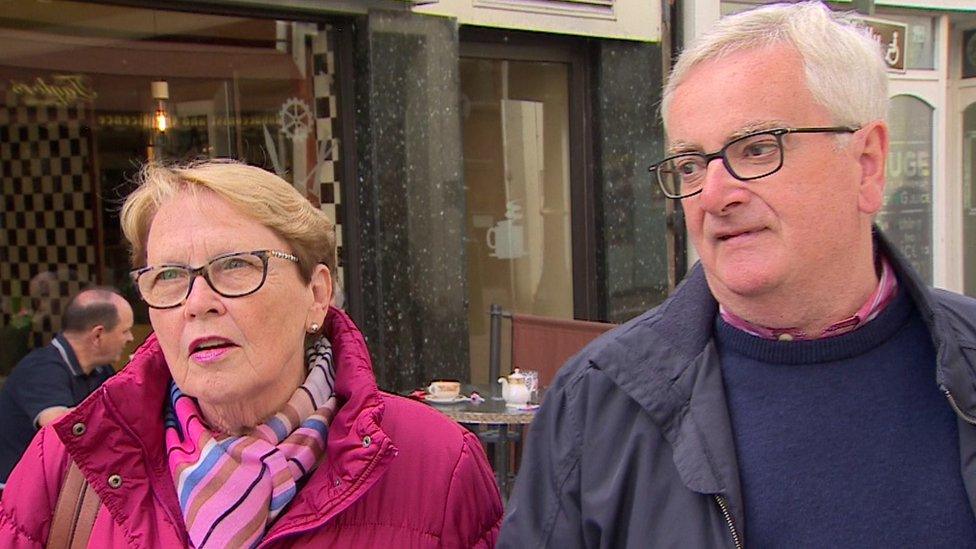
Ieuan and Nesta Davies expressed respect for the Royal Family
Ffilis Hughes, from Carmarthen, said: "I hope the family carries on going. I really like the Queen and the whole family to be honest. I think it will be in safe hands with William."
A major new study by Cardiff University's Wales Election Study suggested 55% of people support having a monarchy, while more than a quarter (28%), would prefer an elected head of state.
The research was carried out online by YouGov for The Wales Election Study 2021 in March 2022, where 3,041 people over 16 in Wales were asked about their attitudes to the monarchy.
The results showed 4 out of 5 (80%) of respondents thought it was likely the UK would have a royal family in 10 years' time.
The figures also suggested Welsh people believe very strongly that they cost the public too much money: 58% of those questioned agreed with the statement that they believe the monarchy receives too much money and 39% of those agreeing strongly with the statement. Only 14% disagreed with the premise.
Director of Cardiff University's Wales Governance Centre Prof Richard Wyn Jones, said: "We find a comfortable majority of people in Wales supporting the principle of monarchy, far less support for an elected head of state.
"But also in terms of expectations for the future, most people believe the monarchy will survive the current queen and the foreseeable future."
However, he said he believed support for the monarchy is anchored in respect for the Queen.
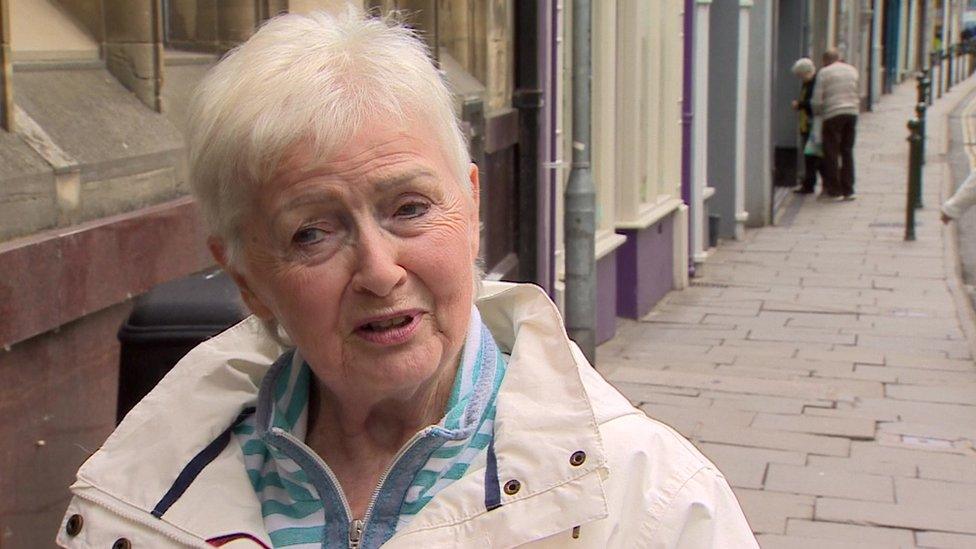
Ffilis Hughes thinks the royal family will be safe hands with Prince William
"She's been a constant, she's highly respected. I do wonder how quickly attitudes may change when we get to King Charles and Queen Camilla."
In Cardiff, four generations of the same family are passionate supporters.
Great grandmother Jeanette Parsons, 89, remembers the Queen's coronation in 1953, which followed her accession to the throne the previous year.
"I think everybody loved royalty then. It's amazing how people sort of worshipped royalty then, and they don't anymore. It'll never be like that again unfortunately.
"Monarchy is a wonderful thing and I think as long as they keep it sensible….I don't think another coronation will ever be quite the same because it's a different world.
"We're multicultural and you've got to accept that and people are going to boo royalty and things.
"It was a fairy tale I think, the Queen, and her handsome husband.
"It was romance, and everybody loves romance don't they?"

Richard Wyn Jones says the findings of the research that support for the monarchy was tied in with respect for the Queen
Her daughter, Emma Parsons-Reid, 54, said: "I love a get-together and I love tradition.
"I had a street party in this road when I was 10, for the Silver Jubilee… it stayed with me, that feeling of the flags up, the food, the fun."
When she moved to her current home in Ely, Cardiff, she organised a street party for every royal occasion.
This year, she has invited the whole estate, saying the celebrations will be "bigger and better," as "it'll be the last Jubilee probably most of us will see".
Hannah Bees, 32, got married the same year Kate and William did. She has followed their relationship with interest and has raised "young children at the same time as Kate".
She hopes royal parties will continue in the future as it is part of "who we are".
"However, I do fear without the Queen things may slide slightly.
"I just think that Kate and William for me are the biggest push for my generation and the younger generation to keep it going."
Hannah's daughter, Izabella Bees, was just one year old when she attended her first Jubilee party in 2012.
Now 11, she also hopes to continue the tradition.
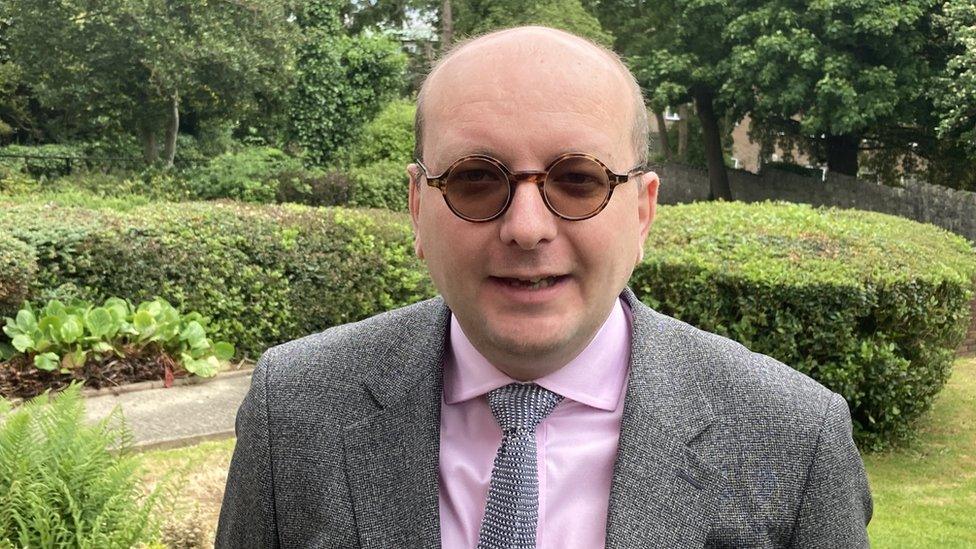
Dr Craig Prescott says devolution could influence support for the monarchy in the future
This family's views are in stark contrast to Melanie Owen from Aberystwyth. She is "not sure what role the royal family plays in modern Britain".
"The whole saga with Prince Harry and Meghan Markle has definitely changed the way I view the royal family.
"When she married into the royal family I felt this was going to be a huge step forward for them and it was dragging them into this century and they were going to start representing modern Britain and she'd be a big asset for the royal family.
"As a person of colour and you've seen how people can be racist, my natural reaction is to believe her.
"The way this all fell apart and the family's reaction, or lack of reaction to the way she was treated really made me question how modern they actually are."
She added that the "the optics of having a decadent jubilee celebration when we're in a cost of living crisis is just not OK and that's been judged really badly".
Gwenno Dafydd from Cardiff plans to fast throughout the Jubilee weekend and will donate the money she saves on meals to food banks.
"I feel very passionately that the amount of time and money that is being spent on these celebrations at a time when we're suffering even more austerity than we have had over the last 10 years or so is insensitive and not the best way to approach this event."
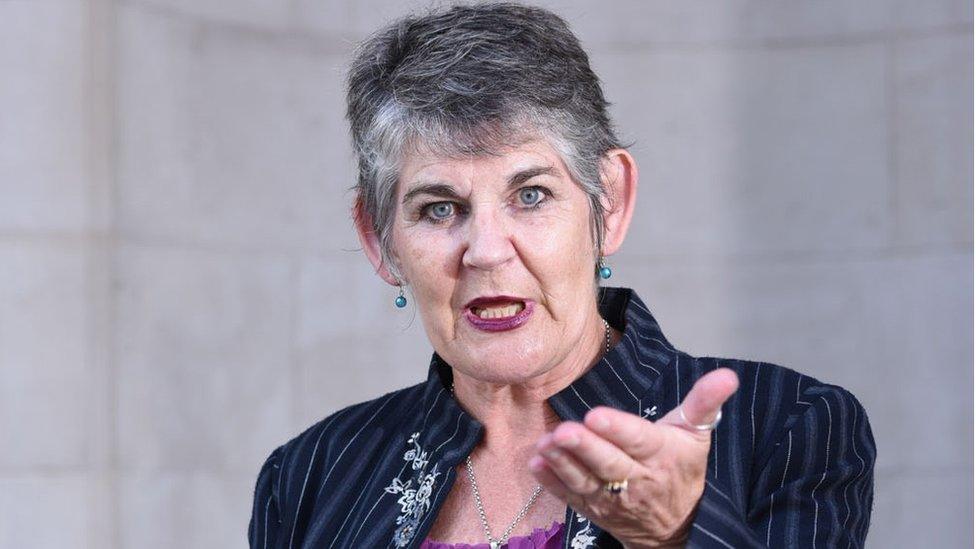
Gwenno Dafydd plans to fast over the jubilee weekend and donate the money she saves to a food bank
Dr Craig Prescott, expert in constitutional law and politics at Bangor University said: "I think one big challenge is clearly, Wales is pursuing its own political direction with increasing powers to the Welsh Parliament, which the Welsh government are going to use to the full, and so there's an extent that politically Wales may start to increasingly diverge from England.
"That will have a broader impact on society and the monarchy will need to try and track and follow that.
"But if the monarchy is based in Windsor or London, it's harder for it to do that. So, it will have to put some special attention to Wales, to try and maintain support in Wales, as perhaps Wales diverges from the rest of the UK, in the way Scotland has done."
Dr Prescott added that the royal family was "going to be smaller" in the future.
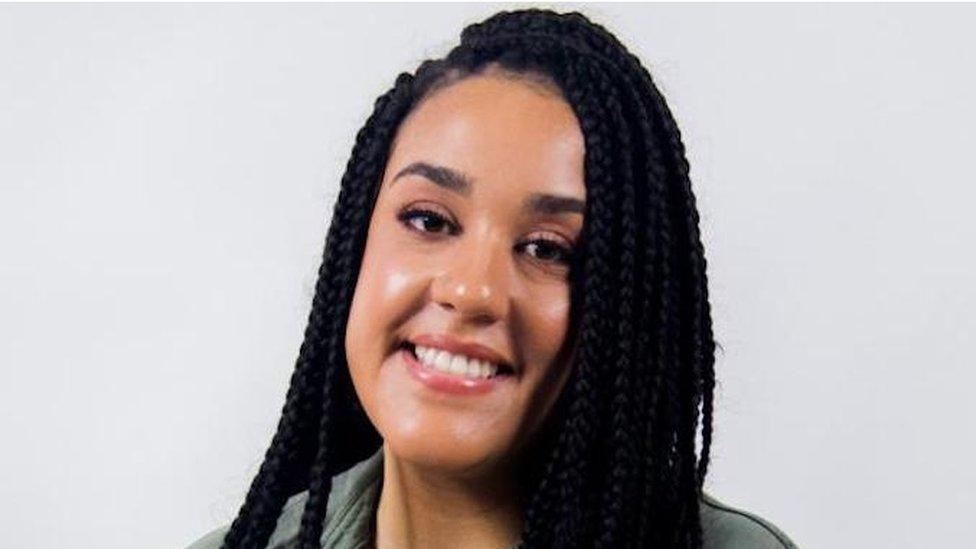
Melanie Owen thought Meghan joining the Royal Family was a "huge step forward"
"The plans are for the monarchy to slim down, and to some extent it's already happened by accident with Prince Andrew and Prince Harry sort of departing from the scene for very different reasons.
"And then that leaves a challenge for those that are left, to ensure that they do engage with the different communities that make up the multi-racial Britain and the multi-racial Wales that we now are.
"That is a much harder task I think, with fewer members of the Royal Family.
"There is a risk that it could slide into irrelevance if people don't feel any sort of connection with a smaller Royal Family."

THE DAY I MET THE QUEEN: Stories across Wales from people who have met The Queen
STILL SINGING: Dunvant Male Choir and its enduring appeal

- Published24 May 2022
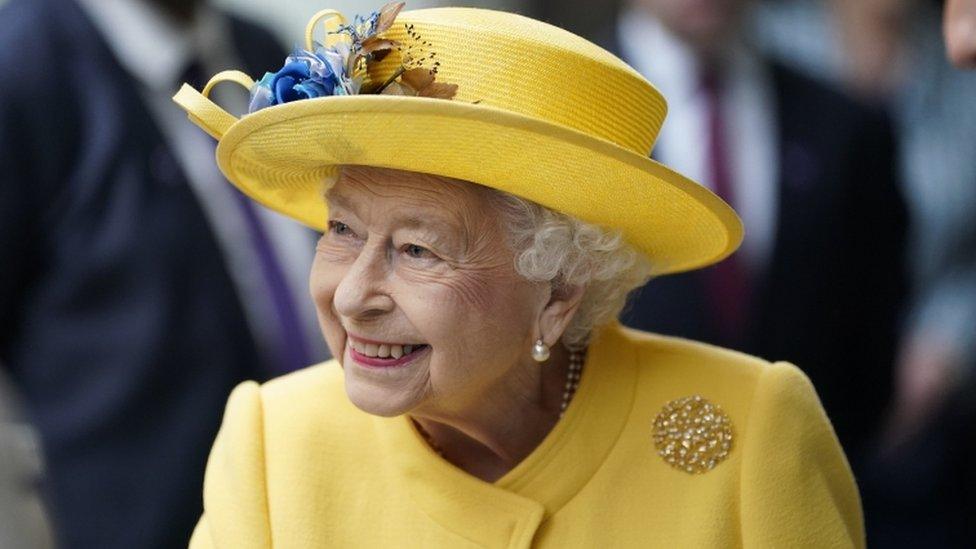
- Published20 May 2022
